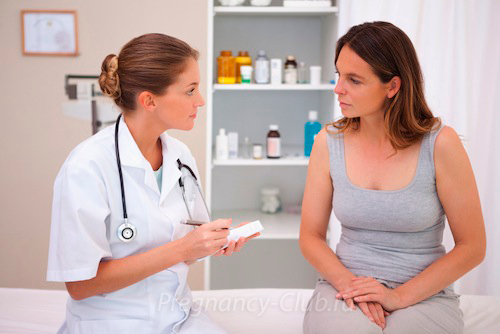Hormonal changes during pregnancy. Hormonal levels during pregnancy - how pregnancy changes when it is disrupted
For normal functioning Correct hormonal levels are very important for the body. The functioning of many organs depends on the content and concentration of hormones. During pregnancy, hormonal levels gradually change naturally, creating the most favorable conditions for the development of the baby. Endocrine organs produce necessary hormones V the right amount, but sometimes malfunctions occur, and the amount of hormones changes dramatically.
During pregnancy, hormonal imbalances can lead to very unpleasant consequences, such as frequent severe pain in the lower abdomen, smearing bleeding and even the threat of miscarriage. Hormonal disorders complicate the process of delivery and can cause problems associated with insufficient labor body. And in postpartum period failures lead to problems with lactation, slow and incomplete uterine contractions, inability full recovery body after childbirth.
Obstetricians-gynecologists closely monitor a woman’s condition during pregnancy and can detect hormonal imbalances in time. A blood test for hormones will help to correctly diagnose and find out the cause of this disorder. ultrasonography, analysis for sexually transmitted diseases and a number of other tests. It is especially important that the woman informs the doctor about all unpleasant sensations and conditions, only in this case will he be able to timely identify the disease and prevent its development.
Pregnant women should pay serious attention not only to your health, but also emotional state. Often the first sign of hormonal imbalance is a sharp change at the emotional level. People make up legends about the whims of pregnant women, and few people know that tearfulness, aggressiveness, and irritability come precisely from such violations. If something constantly depresses you, tell your doctor about it, maybe it’s not just a bad mood.
Hormonal imbalances can and should be treated. During pregnancy, gynecologists prescribe only drugs that act gently and cannot harm the mother and child. Modern medicines can stimulate or, conversely, slow down the production of hormones with minimal impact on the baby. Important and healthy image life, good nutrition and taking vitamins. Only like this A complex approach will be able to balance hormonal levels and contribute to the birth of a healthy child.
There are hormones that are necessary for normal course pregnancy and childbirth. There are several of them, and each of them is responsible for a certain type of activity of the body.
hCG ( human chorionic gonadotropin person)
HCG is called the pregnancy hormone, and it is its presence in the blood and urine in tests that signals that fertilization has occurred. A pregnancy test can show results from the first days, determining the presence or absence of this hormone. HCG is the only hormone that is produced not by the woman’s body, but by the embryo - it can be determined already on the seventh day after fertilization. The level of this hormone in the body reaches its maximum by the tenth week of pregnancy, and then declines. And after the level of this hormone decreases, the period of nausea ends, because it is very closely related to it. After childbirth, hCG disappears.
In the first days after fertilization, hCG stimulates corpus luteum, which develops in the ovary after ovulation. The corpus luteum produces two other hormones: estrogen and progesterone. HCG blocks the ovarian cycle with the help of progesterone. In this way, the fertilized egg can attach to the walls of the uterus and ovulation will no longer occur.
Estrogen
When fertilization occurs, estrogens begin to be produced by the ovaries in more than usual - up to twenty times more at the beginning of pregnancy and three hundred times more at the end. Due to an increase in estrogen levels, the breasts increase in volume, become more sensitive, even painful, which is often the first sign of pregnancy for women.
By the tenth day of pregnancy, estrogen ceases to be produced in the ovaries, and the placenta begins to secrete it. The task of the hormone estrogen in this case is to prepare the uterus to accept the embryo, and thanks to this hormone, the uterus holds the embryo and nourishes it throughout the entire period of pregnancy. In general, estrogen stimulates the female body.
This hormone, alas, is also responsible for other changes in the body, such as pigmentation, skin thinning, and hair loss. Often a “mask of pregnancy” appears, the so-called chloasma, which is symmetrical brown spots on the face  . It occurs especially when the face is not protected from ultraviolet rays.
. It occurs especially when the face is not protected from ultraviolet rays.
Progesterone
Progesterone is produced first by the ovaries, then by the placenta - its level during pregnancy rises to a thousand. Together with estrogen, progesterone prepares the uterus to receive the embryo, its attachment and further nutrition. But if estrogen has a rather stimulating effect on the body, progesterone, on the contrary, calms it. It relaxes the muscles of the uterus, resisting its natural contractions. Without this, pregnancy could not proceed. But in addition to relaxing the uterus, this hormone also acts on other tissues of the body, for example, on the intestines, which become “lazy”, causing constipation and bloating.  in expectant mothers. Progesterone also helps to dilate veins.
in expectant mothers. Progesterone also helps to dilate veins.
Oxytocin
Throughout pregnancy, the pituitary gland produces the hormone oxytocin, but at first it behaves very calmly, without interfering with the functioning of the body. Progesterone increases at the beginning of pregnancy  leader among other hormones, it prevents estrogen from producing uterine contractions. But when the moment of childbirth comes, the level of progesterone drops sharply, and then oxytocin comes to the fore - it is what helps the uterus contract.
leader among other hormones, it prevents estrogen from producing uterine contractions. But when the moment of childbirth comes, the level of progesterone drops sharply, and then oxytocin comes to the fore - it is what helps the uterus contract.
Prolactin
This hormone is also produced by the pituitary gland and is responsible for milk production mammary glands. The amount of prolactin increases with increasing pregnancy and continues to increase after childbirth. When a baby nurses, a signal is sent to the pituitary gland to continue secreting prolactin. Its production does not allow menstruation to return, but one should not assume that this protects against conception.
Endorphin
Endorphin is commonly called the hormone of happiness or joy, and its release by the brain occurs during emotional outbursts. Endorphins have an analgesic function and give a feeling of euphoria. During childbirth, endorphins help a woman cope with pain and endure contractions.
Adrenalin
Adrenaline is produced by the adrenal glands as a response to stress. strong emotion. During childbirth, this hormone helps block the secretion of endorphin and oxytocin, which promote uterine contractions.
What happens during pregnancy?
After the baby is born, the hormonal levels gradually normalize, the secretion of estrogen and progesterone decreases. Because of sharp fall estrogen and progesterone levels may occur postpartum depression, fatigue. Prolactin continues to be produced as the mother needs to feed her baby milk.
Approximately six weeks after birth, when normal menstrual cycle, estrogen and progesterone tend to their normal prenatal levels. Oxytocin remains on after childbirth high level– it helps the uterus shrink in size.
During the period of bearing a baby in female body significant changes are taking place. And the very first thing that changes is hormonal levels during pregnancy. It is hormones that are responsible for conceiving and maintaining pregnancy, and they are to blame for emotional swings and taste changes.
Important role
From trimester to trimester, hormonal levels during pregnancy change almost weekly. And this is necessary for the body expectant mother coped with increasing loads, and the baby himself received everything he needed for growth and development. Accordingly, thanks to hormones, both pregnancy itself and its development to its logical conclusion or childbirth are possible. In addition, hormones prepare a woman for childbirth and contribute to this amazing process.
If there are violations
Many women know firsthand what the likelihood of pregnancy is if there is a hormonal imbalance. Conceiving a child is difficult, but it is possible. It is much more difficult to preserve it and carry it out before the due date. In case of shortage female hormones, as with an excess of males, miscarriages occur or a diagnosis of miscarriage occurs. It is difficult to save a child if the concentration of hormones responsible for maintaining pregnancy and ensuring timely and physiological birth changes.
Important points
In order to understand how hormonal levels change during pregnancy, you need to know about the most important stages this process. The very first moment when you can catch the first hormonal changes- this is conception, or rather some time after it. In this case, changes in hormones are associated with the work of the corpus luteum, which actively produces progesterone. If this hormone is sufficient, then the fertilized egg successfully attaches to the endometrium of the uterus, gradually enlarges and develops. Progesterone is also responsible for changes in the mammary glands and for relaxing the muscles of the uterus. If there is not enough progesterone and this condition is not corrected in time, a miscarriage will occur.
Changing hormonal levels during pregnancy are responsible for irritability, tearfulness and nausea; due to this, a woman quickly gets tired and wants to sleep. At later stages, due to the active production of progesterone, fluid is retained in the body, heartburn and urination become more frequent. It is worth noting that the production of this hormone occurs throughout pregnancy and decreases only before childbirth.
In addition to progesterone, after successful conception human chorionic gonadotropin or hCG begins to be produced, which provokes the corpus luteum to produce progesterone, and also stimulates the ovarian synthesis of estrogen, which is also necessary for successful course pregnancy. Another significant point from the point of view of changes in hormonal levels during pregnancy is the period of 10 weeks. It is now that the placenta begins to function, responsible for the production of other hormones, providing protection, growth and proper development baby.

One of the fairly common problems that arise during pregnancy is inflammation of the appendages.

